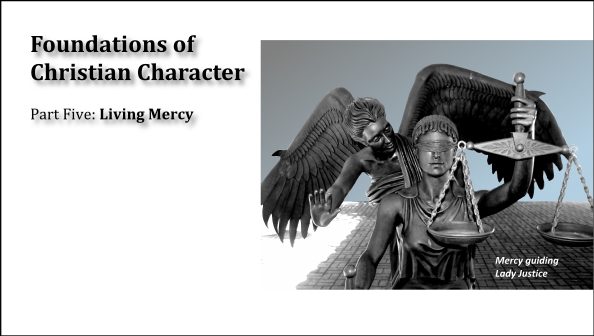By Tyson Thorne

Now that we know what Mercy looks like, and how to change to become the person God wants us to be, what does it look like to live mercifully?
At the start of this series we learned that Justice usually requires a judgment of one kind or another. In God’s Justice the judgment can be one with eternal consequences, and for us it is one of distinguishing who needs a champion, and who needs to be exposed. Lest we forget that our judgments are not meant to consume our daily activities, the half-brother of Jesus reminds us, “For judgment is merciless for the one who has shown no mercy. But mercy triumphs over judgment” (James 2.13).
James may have been thinking about Jesus’s parable of the unmerciful servant (Matthew 18.23-.35) when writing those words. To refresh your memory it is the story of an indentured servant who owed his master a great debt, and was owed a smaller debt by a fellow slave. The master of the house forgave the servant’s debt to him, and then the servant went out and demanded payment by the one who owed him money. The economy of forgiveness was not paid forward, so to speak, and the unmerciful servant is described by Jesus as evil and wicked.
As Christ-followers, we have been forgiven the greatest debt of all. God is patient with us, forgiving, and continues to love us in spite of our constant sin and rebellion. How patient then, ought we to be with the people in our lives? This is one form of mercy that can be the most difficult to practice, but there is another form as well.
The easiest and most difficult people to show mercy are those you know and love. But what about perfect strangers? Going back to James (1.27) we see that “pure and undefiled religion” is to show mercy to those in need, even if they are strangers we are “to care for orphans and widows in their misfortune.” Again, he may have had in mind Jesus’ teaching about the great day of Judgment (Matthew 25.31-.46), where he chastises those who saw others in great need – hunger, thirst, without clothes, sickly or imprisoned – and did nothing to assist them.
When one meditates on how much mercy God has shown him, his heart becomes tender and willing to address the needs of those around him. Whether those needs means forgiving when forgiveness is sought, fulfilling a need when one is presented, caring for the sick or the disenfranchised of our communities, visiting and providing for those who cannot do for themselves, the heart is ready and finds that the feet are ready to go and the hands are ready to serve.
A friend and I exited the highway to fuel up and grab a quick lunch. We were on a road trip, another adventure, like so many we had shared before. After refueling the car we went through a drive through and ordered lunch. I know he and I have big appetites, but he ordered so much food that it raised even my eyebrows. He handed me a bag with my order in it, set another bag between the seats and kept a third on his lap, within easy reach. As we drove back to the highway he stopped the car and called out to a man sitting by the road. He was clearly homeless, and easy to overlook. My friend handed him the bag of food and said “God bless you” before heading back onto the highway. That is living mercy.
|
|
|
